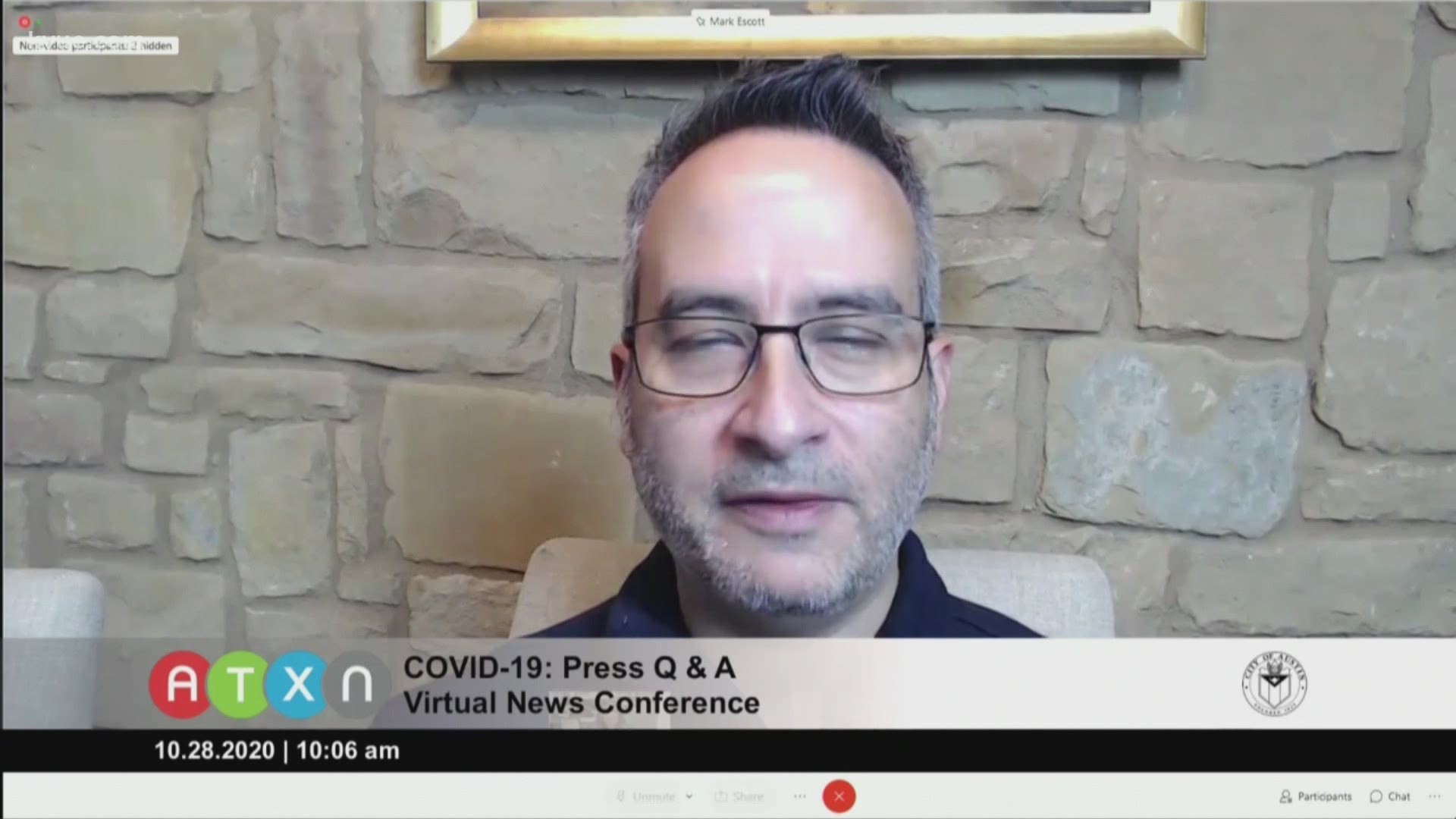AUSTIN, Texas — In the Austin Public Health media Q&A held on Oct. 28, Dr. Mark Escott said he was pleased to report that November projection "doesn't look quite as bleak," but added the University of Texas COVID-19 Modeling Consortium still projected "more than 200 hospitalizations in the week before Thanksgiving."
The news comes one day after Escott told Travis County Court Commissioners the "projections for Thanksgiving are bleak" if the public does not actively reverse the COVID-19 transmission rate.
Escott warned the commissioners that if there was a Thanksgiving coronavirus outbreak in the community, it would take a long time to come back from it, much like the Austin area saw in July.
"Let me start by saying I'm happy to say that the projections from the UT modeling consortium have improved with our dropping admission numbers over the past couple of days," Escott said in the Oct. 28 APH media Q&A. "So, the projection doesn't look quite as bleak for the middle of November, but there still is a projection for more than 250 admissions in the week before Thanksgiving. Our hospitals continue to respond and prepare for surge activities. We have identified additional capacity within the walls of the hospitals if that is needed."
In Austin Pubic Health's COVID-19 media Q&A on Oct.14, Dr. Mark Escott mentioned the University of Texas COVID-19 Modeling Consortium data as one factor in the reasoning for his recommendation to Travis County Judge Sam Biscoe to opt out of Gov. Greg Abbott's bar reopenings. Dr. Escott said that morning the UT COVID-19 model suggested that there was a 66% chance "the epidemic is growing."
In the Oct. 20 county commissioners court meeting, Escott had told the commissioners the UT model data had risen from a 66% chance "the epidemic is growing" to "almost 90%." KVUE checked the UT model the morning of Oct. 20, and the UT model had increased to a 96% chance. By Oct. 27, it had increased to 100% chance.
It was in the Oct. 27 county commissioners meeting where Escott described the projections as "bleak," heeding a warning to the public to adjust its coronavirus prevention tactics in order to avoid a surge over the holiday season.
"I'll tell you right now, if we experience a surge during Thanksgiving, that surge will not be over by Christmas," Escott said. "It took us a long time to recover from the first surge and we can expect that this one, particularly if it were worse than the first one, may take even longer."
Escott did say in the Oct. 27 meeting, however, that the UT projections he presented had not yet accounted for the 11 hospitalizations recorded on Oct. 26, which he admitted could affect the projections.
When KVUE checked the UT modeling data on Oct. 28, the "probability epidemic is growing" had dropped from 100% to 38% and the "14-day change" had dropped from 110% more infections to 5%.
Hospitalization projections for late November dropped from more than 700 to "projections of more than 250 hospitalizations in the week before Thanksgiving," according to Escott.
Escott said APH is still concerned about its "most limited asset": hospital personnel.
"We know that with increasing activity of COVID-19, we can expect increasing absenteeism on our staff. Are they sick themselves or caring for someone who is sick?" Escott said.
Escott said all of this, combined with the threat of the common flu, is why it's important to continue to take precaution going into the winter months of the calendar year.
APH Director Stephanie Hayden issued a call to action for Travis County residents.
"This can be avoided," Hayden said. "We can come together as a community, as an individual and with your household, and we can make a decision that we are not going to overrun our hospital systems. We are going to get our flu shots. We are going to establish our goals for the end of the year. We are going to continue to wash our hands often. We are going to be six feet distanced from others. And we are going to continue to wear our face coverings. Austin-Travis County ... we know that you can do this and you've always stepped up. So we are going to avoid these hospitalizations because we've done it before, so we will do it again."
PEOPLE ARE ALSO READING:

